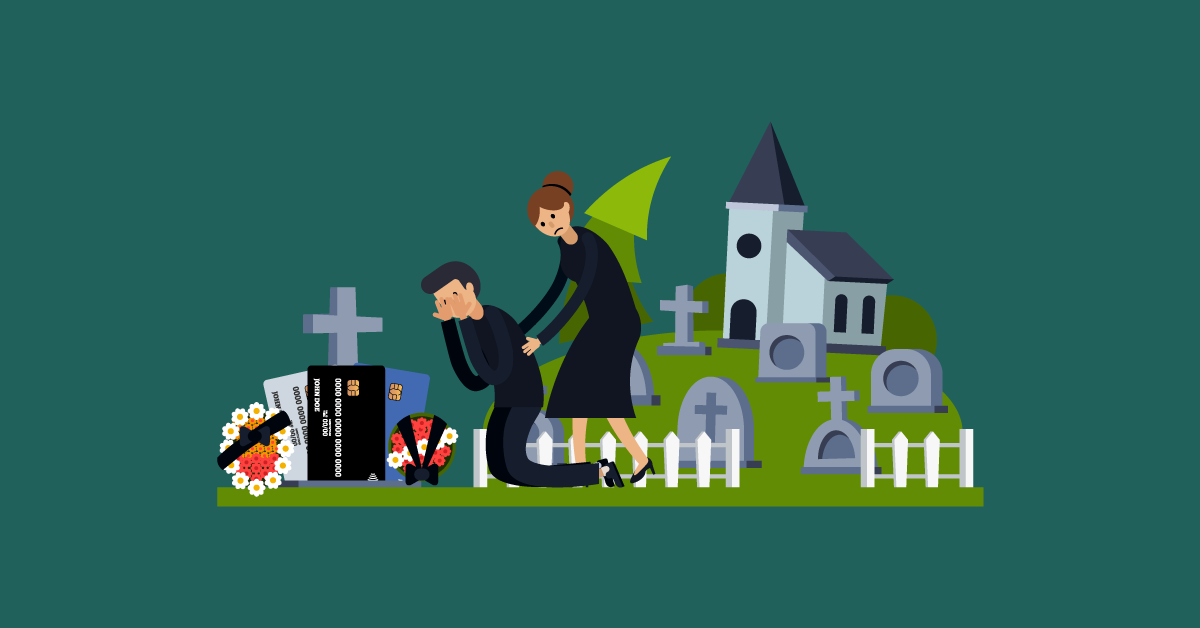Credit card debt is known as unsecured debt, which means it isn’t linked to collateral assets like a house. The debt is paid through the deceased’s assets. An executor settles debts through the estate before the assets are distributed to beneficiaries. The assets are considered insolvent if the estate isn’t enough to repay the debt.
The authorized users aren’t held accountable for the card debt after the user’s death. This indicates that family members aren’t responsible for settling debt unless it was a joint account. However, some states assign the surviving spouse the responsibility to clear the outstanding debt.
Who Is Responsible for Credit Card Debt?
Relatives or authorized users are not responsible for clearing the deceased’s debts. The responsibility for paying credit card debt after death depends on the nature of the account. A person is accountable for the debt if it’s from a joint account or cosigned for a credit card. This criterion makes a user responsible for repaying the credit card debt for their loved ones. Some states hold spouses responsible for paying debts to their partners.
Such states include Arizona, California, Texas, Idaho, Nevada, Louisiana, New Mexico, Wisconsin, and Washington.
Assets Protected From Creditors
Creditors can’t use some assets to settle credit card debt after death. These assets include life insurance benefits, retirement funds, brokerage accounts, and assets in a living trust. The living trust helps beneficiaries avoid probate processes.
All assets are held and owned by a trust, which distributes the estate according to the deceased’s instructions. This approach protects the assets from creditors and gives flexibility in asset distribution. The trust eliminates the hassles of spending time and money on probate. It also gives beneficiaries the power to negotiate with creditors in resolving unpaid credit card debt after death.
Paying Credit Debts After a Death
Credit card debt after death is covered through the estate. Any asset categorized under the deceased’s estate is used to pay creditors. Credit debts are settled before the wealth is distributed to the respective heirs according to the deceased’s will. Two instances occur in solving credit debit cards: the deceased has an insolvent or solvent estate.
Insolvent Estate
An insolvent estate has assets that can’t pay for debts, funeral expenses, and other liabilities. Assets available are used to pay debts in the following order:
- Funeral and administration expenses
- Creditors with secured loans
- Preferential pending debts, such as tax and social insurance
- Ordinary debts, such as credit cards and personal loans
Solvent Estate
Assets are considered solvent when they’re sufficient for catering to all debts and liabilities. All debts, including credit cards, are cleared if the estate is solvent, and the rest of the money is distributed to beneficiaries. The rule of intestacy is applied in asset distribution when the deceased doesn’t have a will.
An estate executor or personal representative handles the credit debt through the available assets. There are instances when credit debt exceeds total assets. In this case, state law dictates which debt is solved with the available assets. Credit card debt is lower in the repayments hierarchy since it is considered an unsecured loan. A court may order payment for secured loans, such as mortgages and cars. Unsecured debts include medical bills, utility bill arrears, and nursing home debt. These debts are termed as insolvent when the assets can’t accommodate all of them.
What to Do if a Credit Cardholder Dies

When a person dies, the duty of informing financial institutions and canceling credit card accounts is easy to overlook or put off. A lot can go wrong if these important tasks are ignored. Here is more information about credit card debt and what to do when someone dies:
Take Necessary Legal Steps
Hackers or impersonators manipulate credit cards. Estates and spouses should take steps to secure a credit card when someone dies. These steps include:
Deactivate the Deceased Credit Cards
A state executor or spouse should not continue using the credit card unless it’s a joint account. A joint account holder can continue using the credit card and is responsible for the payments. Couples are encouraged to have at least one credit in their names. This is important because the deceased’s credit card is not permitted for use, even if it’s solving funeral expenses.
Using a deceased person’s credit card is considered fraud by the government. Estate lawyers collect these credit cards to limit fraudulent activities by impersonators. These credit cards are destroyed or stored by lawyers to safeguard the estate from being subjected to settling colossal debt.
Organize and Collect Financial Documents
Start by organizing all relevant financial information for the deceased person. The next of kin requests bank financial details through a court order. The court grants permission to give all accounts and their names to an estate executor. This helps them know how much funds are available and which goes into settling credit debt.
Report the Death to the Consumer Credit Bureaus
Inform credit bureaus to prevent identity scammers from requesting credit through the deceased name. The three major credit bureaus, which you might recognize from your credit score are Experian, Equifax and TransUnion. The person must prove their identity as the estate’s executor or authorized user to report a death. A copy of the death certificate and social security number is submitted as proof.
Request a Death Certificate
Apply for multiple copies of the death certificate and send them to credit companies. The certificate helps creditors block card debt after death. Send a copy of the certificate to the insurance companies and estate lawyers to make the death official. To apply for a death certificate, you’re either next of kin or an estate executor.
Continue Making Payments for Joint Credit Cards
A joint account holder is responsible for repaying credit card debt even after the death of a partner. Make timely payments to prevent any negative impact on later credit scores. Ensure that all debts are settled before the termination of the joint account. The approach helps safeguard credit card reputations and avoid future problems with creditors.
Seek Legal Advice on How to Settle Debts Effectively
An unauthorized user needs to settle debts effectively and efficiently. No debtor should use unfair or abusive means in collecting debts. A person is protected against retaliation by the Federal Fair Debt Collection Practices Act (FDCPA). Suppose the dispute can exist anywhere, and an individual files a lawsuit against debt collectors. Knowing their personal rights can help resolve all debts by following necessary protocols.
How To Avoid Credit Card Liability After Death
It’s important to note that loaners won’t cancel credit card debt after death. The easiest way to responsibly manage credit cards is by avoiding unnecessary debts and repaying all debts on time. Limiting credit cards helps users stick to their budget. This approach commonly gives people the discipline to repay the debt on a monthly basis, which helps avoid accumulating a huge amount of interest on the credit card.
The estate executor should keep an eye on credit cards after a person’s death. The best way is by getting updates on credit reports and statements. This assists in disputing credit card charges that don’t align with the deceased’s debt.
Related: Calculating Your Debt To Income Ratio [And Why It Matters]







